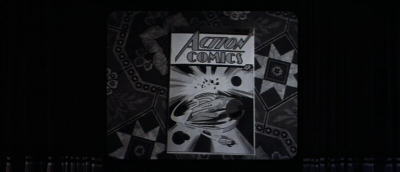
The film opens with the comic book, and as a child reads the opening narration the camera zooms in on one of the panels, taking us out of our world and bringing us into the world of Superman: The Movie.
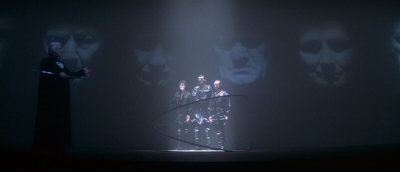
Though otherworldly, this image clearly evokes judgment with the giant faces hovering over the confined accused with their prosecutor presenting their case in the foreground.
Review by Jay Wilson “They can be a great people, Kal-el, if they wish to be. They only lack the light to show the way.” — Marlon Brando as Jor-El I don’t think I’ve ever been as indecisive about a movie as I am about the original 1978 Superman. The first hour and twenty minutes approach perfection in a way that most films only dream about. Scene by scene, shot by shot, beat by beat, and frame by frame it is flawless. Absolutely flawless. And the weird thing is I typically find origin stories boring. Typically I want them to jump right into the super powers and the main plot because that’s where the action is. That’s where the conflict is. And that’s where the story really starts. But Superman: The Movie is something of an anomaly, and I think it’s because Superman, himself, is kinda boring with his unmatched power that renders any and all conflicts moot. But also there’s more going on than just the Man of Steel’s beginning. The Krypton chapter of this tale opens with Jor-El, Superman’s father, condemning three traitors which not only plants the seeds for Superman II, not only gives us a glimpse of life and politics on another world which in turn gives the setting depth and verisimilitude, but also gives the audience what they came to see: spectacular visuals on an epic scale with the reveal of the Phantom Zone. To this day I still get chills watching this sequence as Jor-El silently walks away while General Zod screams his vows of revenge. And watch Terrance Stamp (Zod) carefully. Watch him during the quiet pauses in the darkened chamber. He’s angry, yes, but he’s lashing out out of fear. You can see in his expression the realization that it’s over. His rebellion has failed, and he is doomed. And then does a door open up? No. A large gate? No. Superman: The Movie is bigger than that. The entire building, itself, opens up, exposing the three villains to the Kryptonian elements. And after another well timed pause of anxious anticipation while the audience wonders what grand spectacle will top the last one, the Phantom Zone emerges from deep space to imprison the criminals and carry them away forever ... 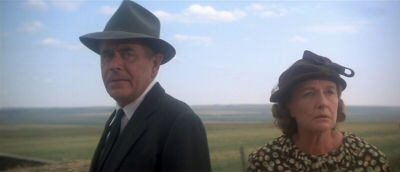
I love how Glenn Ford turns around the long way. He did it so his good side would face the camera. But the moment doesn't feel artificial. It feels old school, classical, bigger than life, and cinematic.
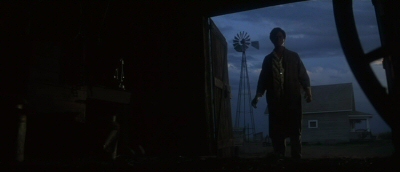
Geoffrey's Unsworth's photography is breathtaking. Narrowing it down to just a dozen screenshots is the hardest thing I've ever had to do on Dark Side of the Soul.
But the real brilliance of the Krypton opening is that it begins at the closing arguments of a trial. We never see the crimes and get only a summary of the charges. This informs the audience that something happened previously. We know about it but haven’t seen it. Through common sense and deductive reasoning, we can imagine a specific chain of events that leads to this place in space-time. And now—because of one scene—Krypton has a history. And because it has a history, it feels more solid and persistent in our mind because there’s more to Krypton than what’s been shown. This theme carries on in the next scene where the council overrules Jor-El’s plea to evacuate the doomed planet. Again, we never hear the arguments, we never view the evidence, but we know they exist because “the facts are undeniable; it’s your conclusions we find unsupportable,” and the council swears Jor-El to silence and, unknowingly, dooms the population. A single scene generates another unseen chain of events. Another history. And Krypton becomes a living breathing world. A real place. A place with minutia and grandeur, a place with criminals and politics. Egos and benevolence. And even though it’s an abstract utopia, we can relate to it which makes its destruction all the more tragic. Now let me ask you this: what movie—other than Psycho—has spent so much time and resources on characters never to appear again? And like Psycho’s Marion Crane scenes, the Krypton sequences do not feel like a throw away because they establish key information that drives the rest of the movie. 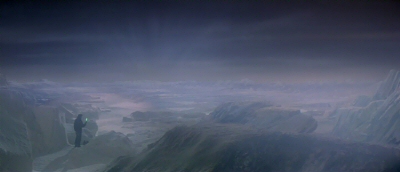
And now a haunting frozen desert with a single lonely figure, young lost Kal-El, standing in the foreground.
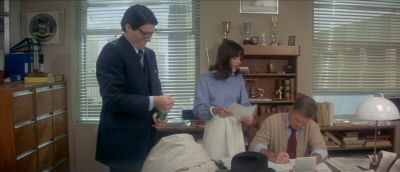
One of the wonders of Superman: The Movie is Christopher Reeve's dual role as the bumbling Clark Kent pictured here struggling to open a bottle of (presumably) soda ...
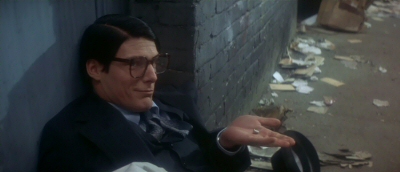
... and how he can seamlessly transition to Superman.
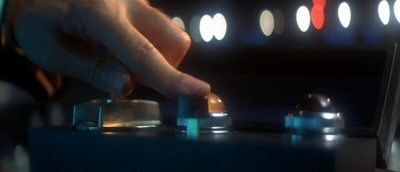
This scene and this shot in particular screams over the top megalomaniacal comic book villain.
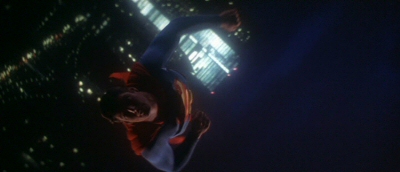
My favorite shot: Superman flies into view, and then the inverted Metropolis skyline descends into the frame revealing Superman and the camera are upside down. Finally Superman rolls with the camera until the skyline is right side up.
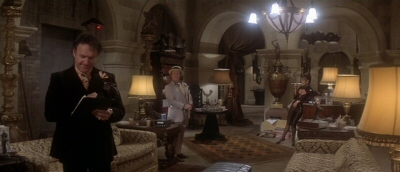
Notice how your eye follows the three figures deeper into the frame, and then how the lampshades and the architectural arches return your eye back to Gene Hackman in the foreground. Notice also the pleasing arrangement of straight lines and curves that flow into each other and keep the eye forever moving from one focal point to the next.
More amazing still is the pacing—God, the pacing—it breezes by like an elongated yet elegant montage, effortlessly and gracefully transitioning across the cosmos to the Kents’ discovery of the young orphaned Kal-El; they witness his first act of superhuman strength, and just a hint of John Williams’ unforgettable Superman theme plays. One scene later, we flash forward to Kal-El under his new name, Clark Kent, in high school, already playing the dual role as the dorky kid picked on by the jocks even though he can kick a field goal to Saturn’s moon, Titan, when nobody is looking (because kicking a field goal to our moon is for pussies.) Superspeed back to the Kent farm and literally one scene later Jonathan Kent passes away, and yet actor Glenn Ford carries so much warmth and charisma, it feels like we’ve spent the entire movie in Smallville listening to his wisdom. “When you first came to us,” he says in his final scene, “we thought that people would come and take you away because when they found, you know, the things you can do, and that worried us a lot. But then a man gets older, and he thinks a little different, and things get very clear.” Yes, he goes on to tell young Clark that he’s here for a reason, but notice he first expresses his love and concern for the boy, his fatherly instinct to nourish and protect him. Notice also when Jonathan Kent continues his deep heartfelt speech, he falters, “I don’t know whose reason. Whatever the reason is ... maybe it’s because ... I don’t know, it’s a ...” but it doesn’t make him less of a character nor less of an inspiration. It makes him human. “But I do know one thing: it’s not to make touchdowns.” He may not be the articulate master of language like Jor-El, but he’s a damn good father none-the-less. This is one scene. This is one speech. And when Clark tells his earth-mother, “all those things I can do ... all those powers ... and I couldn’t even save him” we feel his sense of world-shattering loss, one that will send him wandering the arctic-circle in search of answers where, in the Fortress of Solitude, after a seeming eternity that spanned only a mere twenty minutes, he’ll reconnect with his birth father and his Kryptonian heritage then finally, nearly an hour into the film, we finally see the Man of Steel. We’re finally introduced to the stars of this movie: Christopher Reeve and Margot Kidder. I even love the supporting cast. Jackie Cooper plays the awesomely caricature Perry White, whose dialog is a slyly tongue-in-cheek nudge to the audience using phrases lifted straight from the comics “Clark Kent is not just a mild mannered reporter ....” And Marc McClure who does the unthinkable: makes Jimmy Olsen a sympathetic member of the Daily Planet team and not just a whiney worthless tagalong. Now look back at the wealth of information provided to us and marvel at the economy of scenes used to convey it, feeling neither forced nor rushed. Also check out how the movie seamlessly shifts gears from the epic spectacle of Krypton to the heartwarming drama of Smallville to the self-aware comic book on celluloid in Metropolis as Superman first appears to save the day, picking up helicopters with one hand, dragging fleeing criminals in their escape boat back to the police station, and rescuing cats out of trees. I’ll say it again: the first hour of Superman: The Movie is absolutely undeniably frickin’ perfect. My suspension of disbelief starts to break down with Lex Luthor, but here’s the weird thing: I adore Gene Hackman in this role. I particularly love that he actively challenges and makes the first move to engage Superman. I love Ned Beatty as the bumbling side-kick Otis (especially juxtaposed to seeing Beatty play the awesomely confident Teddy Rosevelt-inspired CEO of a media corporation in Sidney Lumet’s Network). Together, they’re comedy gold ... but I just can’t buy them pulling off Lex’s real estate scheme. I think it’s because if Lex were the multi-billionaire supervillain—er, sorry, “the greatest criminal mind of our time”—he’d have somebody else around besides two fifth rate henchmen. It gets weirder still: I can actually buy into them defeating Superman with kryptonite. Superman has no knowledge of Lex nor his own weaknesses, giving Lex the one-time advantage to think, plan, and prepare. But I think the real reason I believe one and not the other is the kryptonite acquisition happens offscreen and is only mentioned in passing by Perry White. By contrast, we see the missile hijackings, and we see how utterly ridiculous they are with Miss Tessmacher’s overexposed cleavage getting them past an entire convoy of armed soldiers. 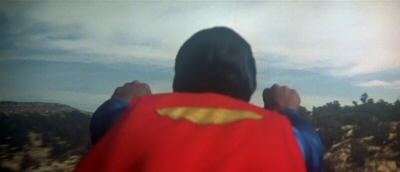
While 99.9% of the shots in Superman: The Movie are spellbindingly brilliant, not all of them are winners.
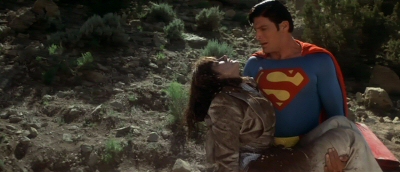
Superman: The Movie works because it manages to find a vulnerability which enables the emotional conflict necessary for any story and character arc and it goes back to Jonathan Kent: he may be the Man of Steel, but everyone he cares about is human.
And it seems like half the time I watch Superman: The Movie, I can get over that critical glaring flaw and become engaged again in the rocket chase, I can get caught up in the drama of Superman’s inability to stop all the destruction of the Earthquake, and yes, I can even believe Lois Lane’s death would enrage Superman enough to go against Jor-El’s teachings and turn back time by reversing Earth’s spin—physics be damned. The other half of the time? I just don’t care. The movie loses me completely, and while my eyes still watches Superman bench press the State of California to fix the San Andreas fault, my mind is elsewhere. Wandering. Wondering, “how can a movie that started so beautifully—so perfectly—lose me so fast?” And why is it different every time I watch it? | ||||||||||||||||||||
|
| ||||||||||||||||||||
